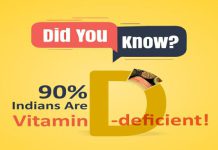

Experts have suggested that when a person consumes a particular vitamin more than his/her dietary requirements for an extended period, it can turn out to be toxic. This is mostly seen in the case of fat-soluble vitamins compared to water-soluble ones because the latter gets washed away.
Vitamin A
This vitamin aids in better vision, giving better thermal stability to eyes, regulation of bones and muscle growth, development of mucus membrane for enhanced immune response, etc. Natural sources of this nutrient are carrots, sweet potato, cord liver oil, eggs, and other dairy products.
The good thing about this vitamin is that it quenches reactive oxygen and delays the oxidation process; due to which further tissue damage is lowered.
The downside is that vitamin A is susceptible to the process of spontaneous oxidation. Thus, if consumed in higher quantity, it adds up to the pro-oxidant effect and enhances tissue damage.
Vitamin D
Vitamin D is taken up by the skin through the adsorption of UV rays from sunlight. This vitamin plays an important role in healthy muscle and bones functions. Vitamin D also promotes the absorption of calcium that is required for healthy teeth, gum, and bones.


However, too much vitamin D can promote oxidative stress in different vital organs of the body, leading to the formation of free radicals; which can further interfere with the normal functioning of important organs of the body.
Vitamin E
Being one of the most potent natural antioxidants available; this vitamin is essential to prevent aging of the skin and normal functioning of the heart. Some other studies have also confirmed that optimum intake of vitamin E can reduce your risk of heart issues, cancers, and dementia. However, it should also be noted that overdose can promote pro-oxidative effects, further causing damage.
Vitamin K
Studies have suggested the use of vitamin K in blood clotting and its routine dietary importance during pregnancy. However, high consumption of this vitamin can be toxic, leading to anemic reactions in the body.










